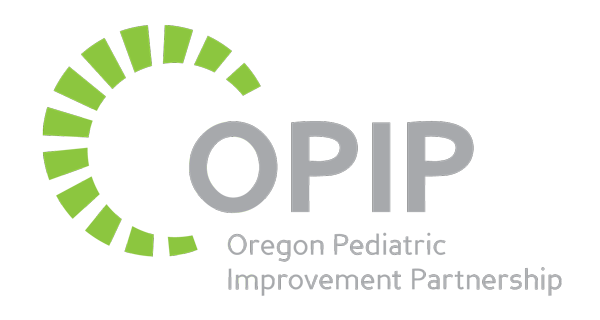
The Oregon Pediatric Improvement Partnership (OPIP) strives to improve the health of children and youth throughout the state. As a sponsor in the American Board of Medical Specialties Portfolio Program®, OPIP enables participating health care providers to earn Maintenance of Certification (MOC) Improvement in Medical Practice credit for doing so.
Based in the Department of Pediatrics at Oregon Health & Science University (OHSU) Doernbecher Children’s Hospital, OPIP takes a population-based approach to quality improvement (QI) by engaging health care providers in health systems and primary care practices across the state through various grant and contract funded projects. “A key component of OPIP’s mission is to create synergy across the public and private sector to ensure that the improvements made are sustainable,” stated OPIP Director Colleen Reuland, MS.
OPIP’s QI efforts are purposely designed to align areas where improvements are needed in child health with the state’s quality priorities and metrics, and OHSU’s quality priorities. As an example, when the state implemented incentives focused on developmental screening and follow-up, OPIP developed a community level QI effort. Providers choose initiatives that are meaningful and relevant for them, but also align with these other priorities. Giving providers the opportunity to do both is what makes OPIP’s QI efforts so successful, Reuland said.
To date, OPIP’s MOC-eligible projects have engaged more than 1,500 providers. Typically, six to eight QI initiatives that offer MOC credit are going on at any given time.
“We’re not recruiting providers to only earn MOC credit,” she said. “We’re asking them to engage in efforts to improve care for children and youth in the state. If they participate, they will not only improve the care of their patients, they will get coaching and support to engage in the initiative, and those who meaningfully participate will receive MOC credit.” There’s a different level of engagement when the focus is the care and not the MOC credit, Reuland added.
The foundation of OPIP’s QI efforts is support, which she acknowledges is very resource intensive. OPIP staff conduct on-site facilitation, facilitate in-person learning sessions, and assist in analyzing population level data. For the developmental screening and follow-up QI initiative, learning sessions brought together pediatricians, primary care providers, mental health providers, early intervention social workers, and home visit coordinators, among others. “It is often the first time that all of these people are in the same room together,” she remarked. “They work in very different systems, but we need them to talk to each other.”
OPIP staff also create tools for specific QI initiatives. Reuland stressed the importance of making sure these tools are customizable and implemented using a thoughtful process. “For example, if we don’t think how the processes and metrics we’re using can be built into the providers’ electronic health record, the initiative will not be sustainable,” she noted. “Any kind of work around is a pain point for physicians.” Working with individuals outside of health care, such as those in the Department of Education, OPIP staff identified community resources for the 12 practices spread across 10 counties engaged in the developmental screening QI initiative. “We did asset mapping for resources, so that providers know who to refer to, how to make the referral, and where the children need to go. We also helped providers implement closed loop communication to determine whether or not the children received the referred services,” Reuland said, adding, “We have seen significant increases in children receiving best match follow-up and accessing early intervention services for evaluation.”
OPIP often includes parents, who Reuland believes are an underutilized resource in QI work. As part of this initiative, OPIP staff interviewed parents to help develop a shared decision-making tree. Parents indicated that they were overwhelmed after hearing their child has a health problem, given a bunch of handouts, and referred to other resources. As a result, they don’t follow through on the recommendations. The physicians like the tool for the same reason the parents do; it enables them to engage more meaningfully with parents and provide them the right sources, Reuland said.
A sponsor since February 2016, OPIP is now supporting the OHSU School of Medicine’s Continuing Professional Development (CPD) Department to expand the Portfolio Program to OHSU faculty university-wide. The expansion builds off the successful model used within the Department of Pediatrics. Beginning this summer, projects that engage providers from five other specialties beyond pediatrics are being reviewed for approval. This expansion will enable OHSU to create an opportunity to share QI initiatives (and lessons learned from those efforts) more broadly across the institution, Reuland said. It also will build upon work conducted across the overall OHSU Health Care System, a current challenge given the size and complexity of being Oregon’s sole academic health center. “We are proud to support this expansion of opportunity to all OHSU-based faculty, as it confirms our commitment to the importance of quality improvement in ways that serve both physicians and patients,” said Nels Carlson, MD, Assistant Dean for CPD.
© 2019, American Board of Medical Specialties.
Read more Portfolio Program Sponsor Spotlights
